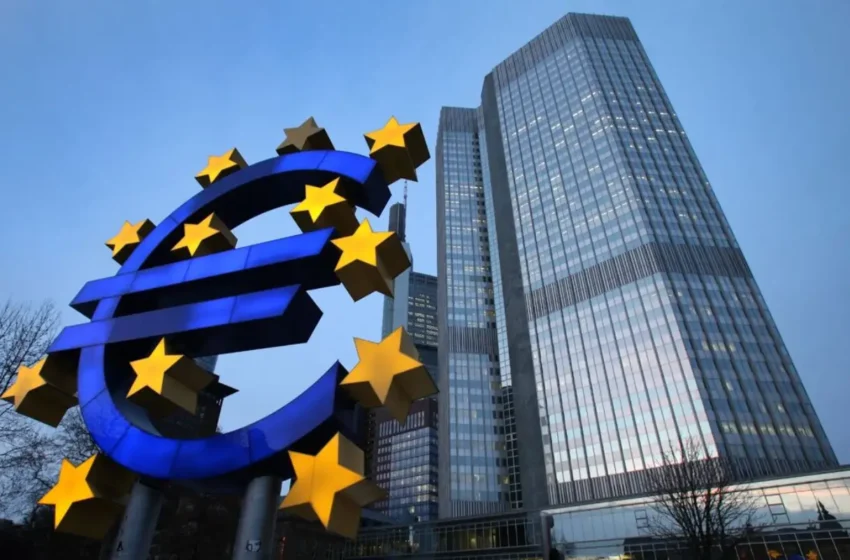Onchain Perp DEX Trading Accelerates With Nearly $1T in 30-Day
EU Push for Digital Euro Threatens Privacy and Financial Autonomy
(Originally posted on : Crypto News – iGaming.org )
Europe is preparing for a digital currency revolution, but it comes with a stern warning: your freedom to spend may no longer be fully your own. European Central Bank Executive Board member Piero Cipollone confirmed that mid-2029 is a realistic timeline for the launch of a digital euro. While policymakers highlight efficiency and stability, critics warn that programmable features could erode privacy and control over personal spending.
Good to Know
- EU finance ministers agreed in September 2025 on digital euro holding limits.
- Legislative progress in the European Parliament will shape the rollout.
- A programmable model could allow authorities to track and restrict spending.
Speaking at the Bloomberg Future of Finance event in Frankfurt, Cipollone said discussions among member states were moving smoothly. He called mid-2029 “a fair assessment” for the launch, provided legislative deadlines are met. A progress report is due in late October, after which lawmakers will have six weeks to propose changes and five months for debate.
On September 19, finance ministers met in Copenhagen with ECB President Christine Lagarde and Commissioner Valdis Dombrovskis. The resulting agreement gives ministers influence over issuance and holding limits, while keeping the final decision with the central bank.
Backers of the project argue that a digital euro could improve payment efficiency, provide a government-controlled alternative to private payment networks, and serve as a counterweight to dollar-backed stablecoins.
New players only. Exclusive Welcome Bonus of up to $2,500
Why Privacy Advocates Are Concerned
The same features that make a digital euro programmable could allow central authorities to decide how money is spent. Purchases deemed harmful, unnecessary, or inconsistent with policy goals could be blocked or restricted. Once the system is in place, financial freedom risks being replaced by digital controls.
As Cipollone and other leaders highlight political progress, citizens must weigh the tradeoff between convenience and autonomy. A programmable euro might simplify payments but at the cost of privacy and choice.







 Bitcoin
Bitcoin  Ethereum
Ethereum  Tether
Tether  XRP
XRP  USDC
USDC  Solana
Solana  TRON
TRON  JUSD
JUSD  Lido Staked Ether
Lido Staked Ether  Dogecoin
Dogecoin  Figure Heloc
Figure Heloc  Cardano
Cardano  WhiteBIT Coin
WhiteBIT Coin  Wrapped stETH
Wrapped stETH  Wrapped Bitcoin
Wrapped Bitcoin  Bitcoin Cash
Bitcoin Cash  USDS
USDS  Binance Bridged USDT (BNB Smart Chain)
Binance Bridged USDT (BNB Smart Chain)  Monero
Monero  LEO Token
LEO Token  Wrapped eETH
Wrapped eETH  Hyperliquid
Hyperliquid  Chainlink
Chainlink  Canton
Canton  Ethena USDe
Ethena USDe  Coinbase Wrapped BTC
Coinbase Wrapped BTC  Stellar
Stellar  WETH
WETH  USD1
USD1  Zcash
Zcash  Litecoin
Litecoin  Dai
Dai  USDT0
USDT0  sUSDS
sUSDS  Avalanche
Avalanche  Sui
Sui  Hedera
Hedera  Shiba Inu
Shiba Inu  Ethena Staked USDe
Ethena Staked USDe  PayPal USD
PayPal USD  World Liberty Financial
World Liberty Financial  Tether Gold
Tether Gold  Rain
Rain  Toncoin
Toncoin  Cronos
Cronos  Polkadot
Polkadot  Uniswap
Uniswap  Mantle
Mantle  Bitget Token
Bitget Token  MemeCore
MemeCore  Falcon USD
Falcon USD  PAX Gold
PAX Gold  Aave
Aave  OKB
OKB  Bittensor
Bittensor  Pepe
Pepe  BlackRock USD Institutional Digital Liquidity Fund
BlackRock USD Institutional Digital Liquidity Fund  Circle USYC
Circle USYC  Global Dollar
Global Dollar  HTX DAO
HTX DAO  Jupiter Perpetuals Liquidity Provider Token
Jupiter Perpetuals Liquidity Provider Token  Pump.fun
Pump.fun  NEAR Protocol
NEAR Protocol  Ethereum Classic
Ethereum Classic  syrupUSDC
syrupUSDC  Binance-Peg WETH
Binance-Peg WETH  Jito Staked SOL
Jito Staked SOL  Internet Computer
Internet Computer  Sky
Sky  Ripple USD
Ripple USD  Pi Network
Pi Network  Ondo
Ondo  BFUSD
BFUSD  Aster
Aster  Binance Bridged USDC (BNB Smart Chain)
Binance Bridged USDC (BNB Smart Chain)  Wrapped BNB
Wrapped BNB  KuCoin
KuCoin  Worldcoin
Worldcoin  Gate
Gate  Binance Staked SOL
Binance Staked SOL  USDD
USDD  POL (ex-MATIC)
POL (ex-MATIC)  Ethena
Ethena  Rocket Pool ETH
Rocket Pool ETH  Aptos
Aptos  Cosmos Hub
Cosmos Hub  Official Trump
Official Trump  MYX Finance
MYX Finance  Algorand
Algorand  Lombard Staked BTC
Lombard Staked BTC  USDtb
USDtb  Function FBTC
Function FBTC  Polygon Bridged USDC (Polygon PoS)
Polygon Bridged USDC (Polygon PoS)  Superstate Short Duration U.S. Government Securities Fund (USTB)
Superstate Short Duration U.S. Government Securities Fund (USTB)  syrupUSDT
syrupUSDT